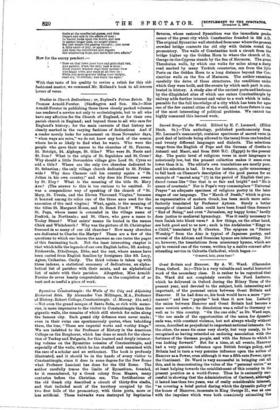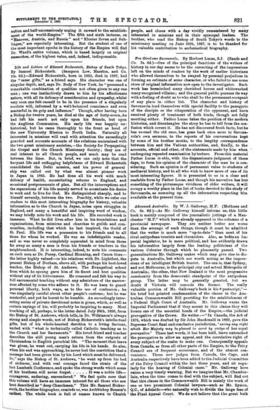Great Britain and Hanover. By A. W. Ward. (Clarendon Press,
Oxford. 5s.)—This is a very valuable and useful historical work of the secondary class. It is rather to be regretted that Dr. Ward did not completely rewrite the Ford Lectures, which he delivered in Oxford during the Hilary Term of the present year, 'and devoted to the subject, both interesting and important, of the personal union between Great Britain and Hanover. If he had done so, his book would have a more " per- manent " and less " popular " look than it now has. Latterly the union between Hanover and Great Britain had become a mere nominis umbra; its dissolution was a relief to Germany as well as to this country. "On the one side," as Dr. Ward says, "the use made of the opportunities of the union for dynastic ends was, with constant violence, but not always wholly without cause, described as prejudicial to important national interests. On the other, the same tie came very slowly, but very surely, to be recognised as having retarded an enduring association with the fortunes of the German people, and with the future to which it was looking forward." But for a time, at all events, Hanover had a very genuine influence upon British foreign policy, and Britain had in turn a very genuine influence upon the action of Hanover as a Power, even although it was a fifth-rate Power, upon the Continent. ' Dr. Ward is very successful in bringing out all this, and in demonstrating the value of the "personal union" as at least helping towards the establishment of•this country in its present position as a world-Power. Thus he is eminently suc- cessful in showing that the Administration of Carteret, although it lasted leas than two years, was of really considerable interest, "as covering a brief period during which the dynastic policy of the house of Hanover, incarnate in King _George II., was at one with the impulses which were both consciously animating the nation and half-unconsciously urging it onward to the establish- ment of the world-Empire." The fifth and sixth lectures, on "Hanover, Austria, and Russia" and "Kloster Zeven and Sub- liegen," are especially interesting. But the student of one of the most important epochs in the history of the Empire will find Dr. Ward's entire volume, which is based largely on original researches, of the highest Value, and, indeed, indispensable.























































 Previous page
Previous page